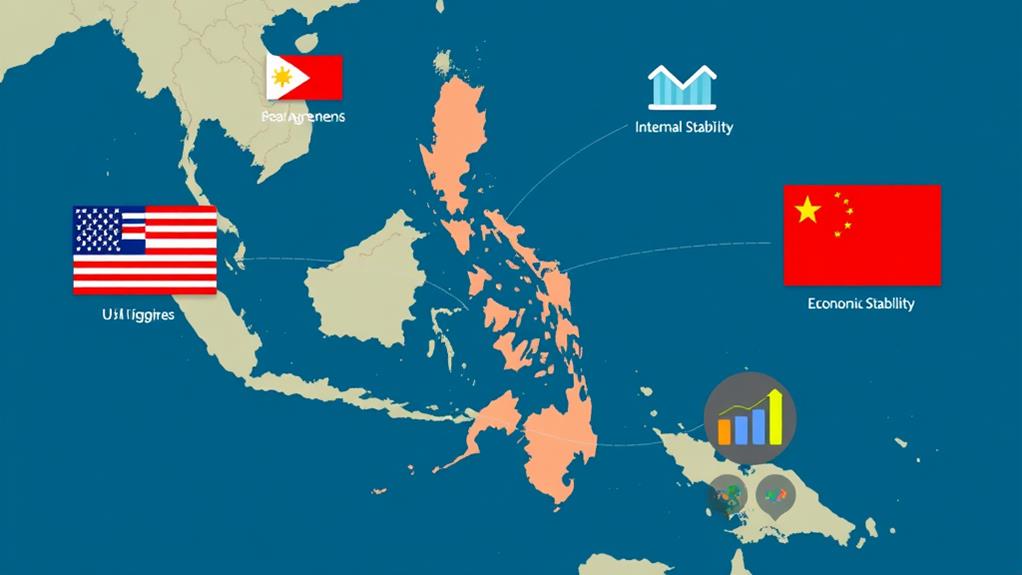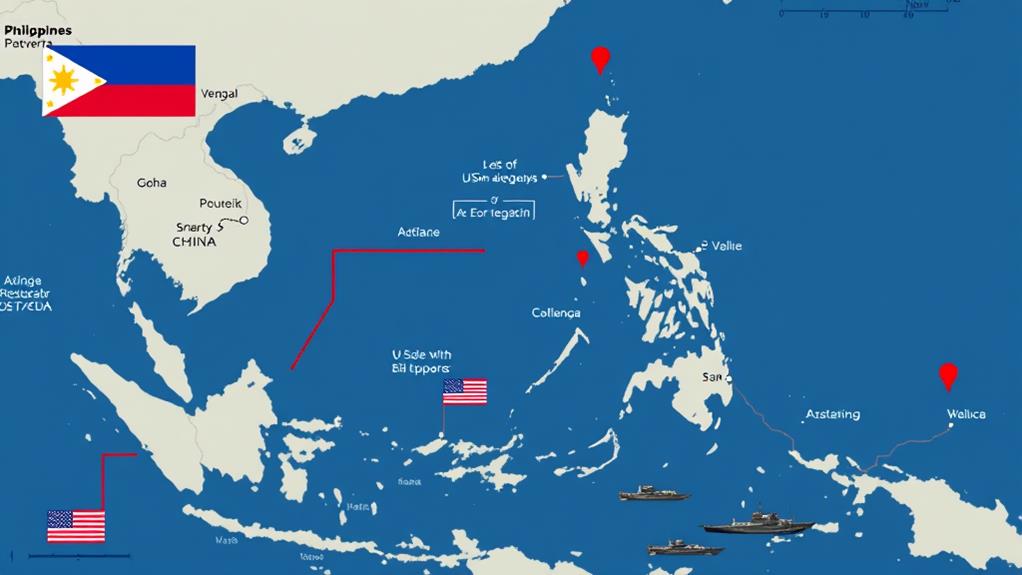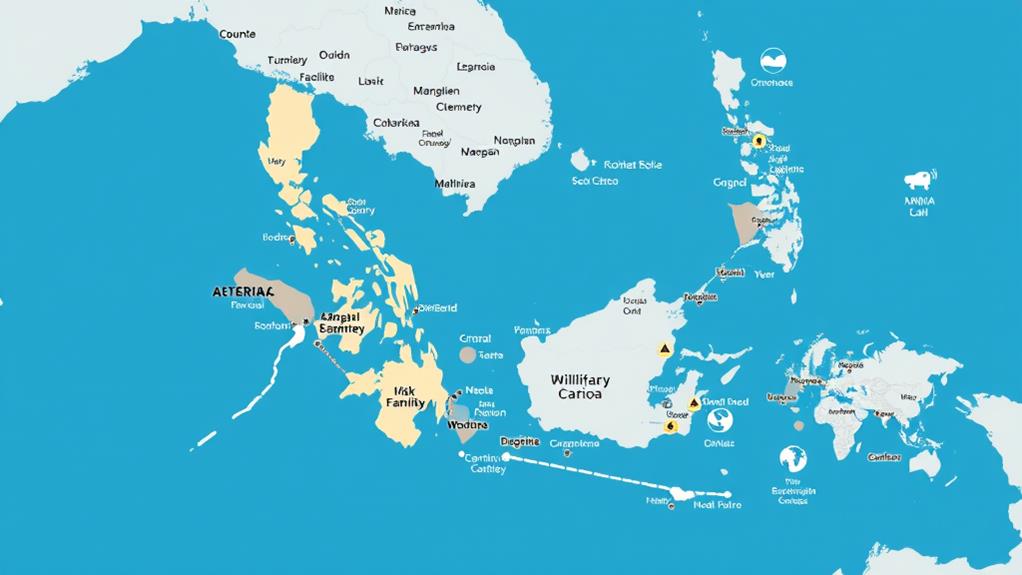The Philippines is caught between the US and China, two powerful nations influencing its maritime security and foreign policy.
The South China Sea conflict poses significant challenges, as both countries vie for control over the contested waters. The Philippines is claiming sovereignty over parts of the sea, including the Scarborough Shoal and the Spratly Islands.
Meanwhile, internal security efforts focus on achieving peace in Mindanao and addressing socioeconomic issues.
Economic growth, driven by domestic consumption and reforms, has positioned the Philippines among the region's fastest-growing markets. The country's gross domestic product (GDP) has been growing steadily, with a growth rate of 6.4% in 2022.
Strengthening alliances with the US, Japan, and Australia through agreements like the Enhanced Defense Cooperation Agreement (EDCA) enhances national security and economic stability.
Effective internal security management is crucial for leveraging economic growth. The Philippine government must address concerns such as terrorism, insurgency, and criminality to create a stable environment for businesses to thrive.
Ongoing diplomatic efforts will be pivotal in shaping the country's trajectory, as the Philippines navigates its relationships with the US, China, and other nations.
Geopolitical Dynamics and Challenges

Philippine Geopolitics: A Delicate Balance
The Philippines plays a crucial role in the Indo-Pacific region, caught between the great power competition between the United States and China. The United States is the Philippines' most important security partner, while China is its top trading partner. This balance poses significant challenges, particularly in the context of the South China Sea conflict, where the Philippines is a key stakeholder.
Maritime Connections: A Historical Significance
The historical importance of waterways, such as the Pasig River as a trade route during the Spanish colonial period, highlights the significance of maritime connections to the region's economic landscape.
Sustainable practices are critical to protect these vital resources.
Navigating a Fragile Regional Order
The Philippines must navigate a fragile regional order, grappling with issues such as:
- The crisis of multilateralism: The decline of international cooperation and institutions poses a threat to regional stability.
- Post-pandemic recovery: The country must recover from the economic and social impacts of the pandemic.
- The uncertain future role of the United States in the region: The Philippines must adapt to changing American priorities and policies.
Additionally, the rapid automation of manufacturing, the formation of competing trade blocs, and the social-ecological transformation of mega cities like Manila further complicate the geopolitical landscape.
Internal Security Challenges
The Philippines faces internal security challenges, including:
- Peace efforts with the Moro Islamic Liberation Front: The government must maintain peace and stability in Mindanao.
- Managing restive regions: The country must address socioeconomic issues in regions like Mindanao to maintain stability and attract investments.
Effective Governance and Socioeconomic Issues
Effective governance and addressing socioeconomic issues like poverty and inequality are crucial for maintaining stability and attracting investments.
The Philippines must develop strategic policy solutions to ensure sustained growth and regional influence.
US-China Power Competition
The Philippines is caught in the middle of a great power competition between the United States and China, which significantly impacts its maritime security, foreign policy, and regional relationships.
Maritime Presence: The US supports the Philippines' claims in the South China Sea through naval patrols. In contrast, China asserts its own claims using gray-zone tactics, which challenge Philippine sovereignty.
Economic Influence: The US fosters trade and investment to strengthen its alliance with the Philippines. China, on the other hand, offers significant economic incentives to test the Philippines' loyalty.
Diplomatic Support: The US reinforces the Mutual Defense Treaty, ensuring the Philippines' protection. China tries to drive a wedge between the US and the Philippines, weakening their alliance.
Strategic Interests: The US aims to protect access to key sea lanes and support a Taiwan contingency. China seeks regional hegemony and control over the near-seas region.
The Philippines' unique position, with its northernmost islands only 233 miles from Taiwan, makes its approach to maritime security crucial.
To uphold its sovereignty, the Philippines has used lawfare, as seen in its 2016 arbitration case against China. However, China's escalating gray-zone tactics continue to challenge Philippine resupply missions and sovereignty claims in the South China Sea.
The Philippines faces complex policy choices, balancing its long-standing alliance with the US against China's economic and coercive pressures.
The country must navigate these challenges to ensure its autonomy and regional stability.
Regional Security Strategies

Southeast Asian countries, including the Philippines, must adopt multifaceted strategies to counter escalating tensions driven by US-China competition.
The Philippines' approach involves a blend of diplomatic, economic, and military initiatives. For instance, Manila has strengthened its alliance with the United States through the Enhanced Defense Cooperation Agreement (EDCA), which aims to bolster the Armed Forces of the Philippines' capabilities for humanitarian assistance and disaster response.
The Philippines is proactive in addressing regional security challenges, such as maritime disputes in the South China Sea. The country's National Security Policy (NSP) 2023-2028 emphasizes the importance of safeguarding its maritime zones, particularly in the West Philippine Sea, and upholding the 2016 South China Sea Arbitration Award.
The NSP also highlights the need for comprehensive and strategic partnerships with other countries to ensure regional and global peace, security, and prosperity.
The Philippines is fostering relationships with other key players, including Japan. Recent trilateral meetings with the United States and Japan underscore the Philippines' commitment to a rules-based international order and its desire to amplify its regional influence through cooperative security measures.
Economic Growth and National Security
Economic Growth and National Security in the Philippines
In Southeast Asia, economic growth and national security are closely linked. For the Philippines, this relationship is crucial as it rises in regional prominence.
The country's economic growth has been significant, with a 7.6% GDP growth in 2022, making it one of the world's fastest-growing large emerging markets.
This growth is driven by domestic consumption, remittances from overseas, and recent reforms that position the Philippines for more investment-led growth. The country's natural wonders, such as Mount Apo, attract tourism and present economic opportunities that can bolster national security through sustainable practices.
Demographic Edge: A Labor Market Advantage
The Philippines has a significant labor market advantage, with 28% of its population between the ages of 10-24. This demographic edge provides a large workforce that can drive economic growth.
Economic Reforms: Fostering Investment and Expansion
Recent policies under President Ferdinand Marcos Jr. have created an environment conducive to investment and economic expansion. These reforms have positioned the Philippines for further growth and development. One key aspect of these policies is the commitment to a comprehensive environmental overview, ensuring that economic expansion does not come at the cost of environmental degradation. By addressing environmental concerns, the Philippines is attracting responsible investors who prioritize sustainability and long-term success. Overall, the proactive approach to balancing economic growth with environmental stewardship demonstrates a commitment to creating a vibrant and sustainable future for the country.
Strategic Partnerships: Enhancing National Security
The Philippines is leveraging its economic growth to strengthen global partnerships, particularly with the United States and Japan, enhancing its national security. These partnerships provide a stable and secure environment for economic growth to flourish.
To fully capitalize on its economic growth and expand its regional influence, the Philippines must effectively manage internal and regional security challenges.
A stable and coherent national security framework will enable the country to address external threats while optimizing its economic opportunities.
How Will Climate Change Challenges Impact the Geopolitical Future of the Philippines?
The philippines climate change negotiations will play a crucial role in shaping the country’s geopolitical future. With rising sea levels and extreme weather events, the Philippines faces significant challenges that will impact its economy, security, and international relations. Adapting to these changes will require strategic diplomacy and cooperation with global partners.
Internal Security and Stability

Internal Security and Stability Are Crucial for the Philippines
Managing internal security and stability is vital for the Philippines to leverage its economic growth and regional influence.
Decades of struggle in the southern island of Mindanao have shaped the country's internal security landscape. However, recent peace efforts have brought significant progress, with the establishment of the Bangsamoro Autonomous Region in Muslim Mindanao offering a promising path to stability.
The Peace Process Between the MILF and the Philippine Government Is Key
The peace process between the Moro Islamic Liberation Front (MILF) and the Philippine government has been instrumental in this development.
The next 13 months are critical for meeting the remaining milestones of the peace agreement and countering potential spoilers, with the first elections in the region scheduled for May 2025. Stability in Bangsamoro isn't just vital for internal peace but also essential for redirecting military resources toward external threats and supporting the country's economic and demographic opportunities.
Effective Management of Internal Security Enables Focus on Territorial Defense
Effective management of internal security will enable the Philippines to focus on its territorial defense and modernize its military, aligning with its national security policy's objectives of defending sovereignty and territorial integrity.
This stability is pivotal for the country's ability to capitalize on its economic growth and demographic edge, positioning it for more investment-led development and regional influence.
International Alliances and Partnerships
The Philippines' strategic location in the Asia-Pacific region makes it crucial for the country to foster strong international alliances and partnerships to bolster its national security.
Shifting Foreign Policy Stance: Under President Ferdinand Marcos Jr., the Philippines has significantly shifted its foreign policy stance, distancing itself from the previous administration's pro-China approach and instead strengthening ties with traditional allies and like-minded nations.
Key Alliances: The Philippines will likely continue to prioritize alliances with the United States, Japan, and Australia to counter Chinese aggression in the region.
Three key aspects of these alliances are:
Enhanced Defense Cooperation: The Enhanced Defense Cooperation Agreement (EDCA) with the United States has been revitalized, allowing for greater military interoperability and the development of additional bases in strategic locations.
This enables the Philippines to strengthen its military capabilities and improve its defense posture.
Regional Security Coordination: Joint maritime patrols and military exercises with allies such as the U.S. and Japan aim to deter Chinese gray zone coercion and protect the Philippines' territorial integrity.
Diplomatic and Economic Ties: Strengthening diplomatic relations and economic cooperation, including investments and trade missions, further solidifies the Philippines' position within these alliances.
This cooperation will enhance regional security and promote economic growth.
These alliances not only enhance the Philippines' military capabilities but also underscore its commitment to upholding the rules-based international order in the face of rising regional tensions.
Questions and Answers
How Does Climate Change Impact Philippine Foreign Policy?
Climate change significantly impacts Philippine foreign policy due to the country's high vulnerability to extreme weather events and rising sea levels.
The Philippines actively participates in global climate discussions, such as the Climate Vulnerable Forum, to address these challenges.
In the Paris Agreement, the country advocates for the 1.5°C target, emphasizing the need for urgent global action.
To enhance its climate resilience, the Philippines seeks international support and cooperation, recognizing that global solidarity is essential to address domestic climate challenges.
What Role Does Digital Transformation Play in Philippine Economic Growth?
Digital transformation is a key driver of Philippine economic growth. The expansion of sectors like e-commerce and fintech, which grew rapidly during the COVID-19 pandemic, has significantly contributed to this growth.
In 2022, the digital economy reached $36.5 billion, accounting for 9.4% of the country's GDP.
To further support this growth, initiatives such as the Philippine Development Plan 2023-2028 and the Digital Transformation Strategy have been implemented.
These plans aim to enhance digital infrastructure, improve connectivity, and foster innovation, ultimately supporting businesses and creating jobs in the digital space.
How Do Natural Disasters Affect the Philippines' Economic Resilience?
Natural disasters significantly impact the Philippines' economic resilience. The country's location makes it prone to various hazards, with 74% of the population exposed to multiple hazards. As a result, the Philippines faces substantial annual losses, with typhoons and earthquakes alone costing $3.5 billion.
These disasters have a ripple effect on the economy, particularly on household income levels, which can lower due to the destruction of properties and infrastructure. This, in turn, exacerbates poverty, especially among vulnerable populations such as low-income families and indigenous communities.
However, natural disasters also present opportunities for growth through "creative destruction". Rebuilding and adaptation efforts can upgrade infrastructure and adopt new technologies, ultimately promoting economic recovery and resilience.
For instance, after a typhoon, the government can invest in storm-resistant infrastructure and renewable energy sources, creating jobs and stimulating local economies.
What Are the Implications of the Philippines' Mineral Resources on Global Trade?
The Philippines is a significant player in global trade due to its rich mineral resources.
As a major producer of nickel, copper, and gold, the Philippines supplies key materials to industries worldwide.
The country accounts for a substantial portion of global production, particularly in nickel and copper exports. These metals are essential for the energy transition sector, and the Philippines is a crucial supplier to regions like China, Japan, and Australia.
For instance, the country's nickel exports are used in the production of electric vehicle batteries and solar panels. Similarly, copper is a vital component in renewable energy systems and infrastructure development.
The Philippines' mineral resources play a vital role in meeting global demand for these metals.
How Does the Philippines Balance Its Relationship With the US and China in Trade?
The Philippines must balance its relationship with the US and China in trade to ensure economic stability and growth.
The country navigates complex geopolitical dynamics, as China is its top trading partner, with $71.9 billion in bilateral trade, while the US is a significant partner, with $36.1 billion in trade in 2022.
Despite tensions over the South China Sea, the Philippines maintains economic ties with both nations, focusing on areas like technology, energy, and agriculture.
This balance is crucial for the country's economic stability and growth, as it allows the Philippines to benefit from the strengths of both partners.